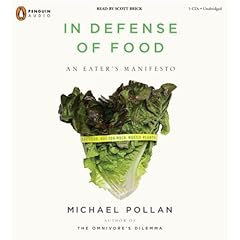I've been reading "In Defense of Food" by Michael Pollan.
 I have to say this book falls into my "life-changing" category. I highly recommend it. The motto of the book is this: "Eat food. Not too much. Mostly plants." Pollan discusses the "Western diet" (lots of carbs, sugars, meats, dairy and processed foods), the growth of "nutritionism" (focusing on nutrients, like saturated fat, instead of actual food) and how we Americans can get healthier by eating what our grandparents ate: whole foods. What I've read so far boils down to this: The Western Diet has caused us Americans to shift from whole foods to processed foods, and we need to shift back to get healthy as a population.
I have to say this book falls into my "life-changing" category. I highly recommend it. The motto of the book is this: "Eat food. Not too much. Mostly plants." Pollan discusses the "Western diet" (lots of carbs, sugars, meats, dairy and processed foods), the growth of "nutritionism" (focusing on nutrients, like saturated fat, instead of actual food) and how we Americans can get healthier by eating what our grandparents ate: whole foods. What I've read so far boils down to this: The Western Diet has caused us Americans to shift from whole foods to processed foods, and we need to shift back to get healthy as a population.And that leads me to my recent trips to the grocery store. On Monday, I was pretty much finished shopping when I began looking at the label on a container of sour cream. I noticed there were some additives on the label I didn't really recognize (according to Pollan, a sign of a processed food), and so I decided to take the short walk over to the organic foods section of the store and do some comparing. The organic sour cream had three simple ingredients, all of which I recognized and could pronounce. The only problem was the organic sour cream was $3, compared to the $.60 (with coupon) I would pay for the non-organic sour cream with additives. I decided to tour the rest of the small organic section, picking up food items and reading the ingredient labels to find that most of the organic foods contained a limited number of ingredients and very few processed additives. The frustrating thing is that organic foods can be so much more expensive!
Since we are serious about cutting processed foods from our diet and wanted to get a good idea of how much going totally organic would cost, Tony and I decided to go to our local Whole Foods store today and price out our grocery list. I bought groceries on Monday and spent $60. The same groceries (only in non- or less-processed organic form) at Whole Foods added up to $101. Unfortunately, that steep of a jump in our grocery budget isn't a possibility, so we will be making more gradual changes. We are going to try to replace processed items with home cookin'. This means I will attempt to make home-made Nutrigrain bars (I found a very promising recipe!), side dishes, etc., but our goal is to introduce one new food a week. We are also working to add more veggies to our diet and are using smaller plates to encourage portion control.
Now, please don't think that we will never again eat processed food because of this. We especially don't want people to think they have to cater to our eating habits. We are just using this blog post to share good information. These changes certainly don't mean we will never eat Doritos, cookies, canned soup or delicious Dr. Pepper again. It just means we want to eat much less of it.
I highly recommend reading "In Defense of Food" if you can get your hands on it. Be prepared to change the way you think about food, for the better. I'll post a more lengthy review after I finish the book!

1 comment:
Thanks for posting this. I sometimes play with idea of eating "cleaner" but then the cost of eating clean knocks me on my butt. It's amazing how the "junk" is so much cheaper. I'll be checking this out at the library next time I go. You should check out this gal...she's amazing! http://www.toscareno.com/
Post a Comment